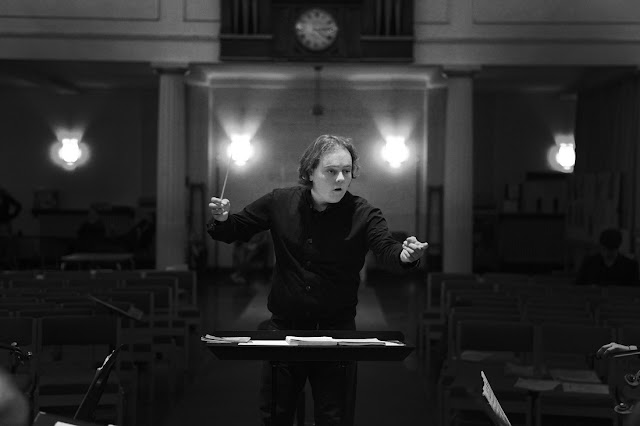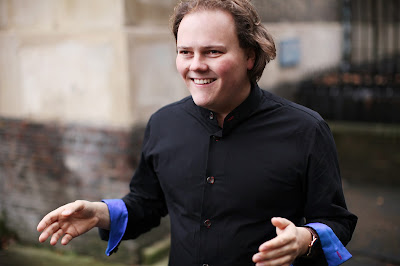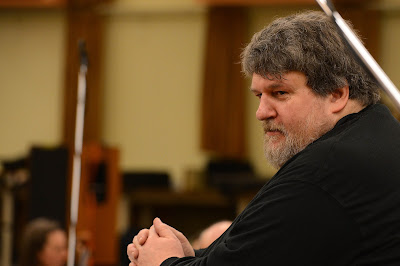 |
| Jonathan Berman |
 |
| Jonathan Berman - photo George Garnier |
As a companion to this Jonathan has chosen Oliver Knussen's Songs without Voices. Knussen's work is based in Walt Whitman settings, but in Songs without Voices the vocal lines are absorbed into the instrumental ensemble. Jonathan sees this as a very apt companion piece as the word is there but not there. There are other connections too, Goehr and Knussen are friends and one of the links Jonathan cites is that Oliver Knussen's Requiem for Sue is based on Goehr's translation of a Rilke text which Goehr chose for a memorial to Sue Knussen. And Jonathan continues this fascinating interlinkage, by describing how Oliver Knussen's setting of a poem created by taking lines from different Emily Dickinson poems echoes Sandy Goehr's Sing Ariel which used a patchwork of texts constructed by Goehr and Frank Kermode from poems ranging from Milton to Wallace Stevens.
Alexander Goehr's music is under represented and misrepresented in the UK
 |
| Alexander Goehr |
Jonathan talks about how Goehr's music does not fit well when played like contemporary music, and that it needs to be approached like Bach, or Beethoven. For Jonathan, with some contemporary music if you simply play what is written then it works well, but with Goehr's music the written text is just the starting point and the players need to interact with each other, and make music. For him Goehr's music is constructed like that of Haydn, one gesture follows another, with responses and with comment. Jonathan is looking forward to performing the music with the Ensemble Modern specifically because he feels that they do not play like an ordinary contemporary music ensemble, the players bring a sensitivity and a flexibiity to their performance.
He has a number of other projects coming up around Goehr's music, including a small festival in the Hague, which will be travelling to Berlin, around the time of Goehr's 85th birthday. The idea is to guide the audience as to how to listen, so Goehr's music will be programmed alongside Bach, Monteverdi, Bruckner and Haydn. But Jonathan says that this is as much for the players as for the audience, the programming enables both players and listeners to zone in to listen to details so that the players can hear how phrases relate to each other, and only then does Goehr's music come off the page.
Jonathan talks about how he has learned a huge amount simply listening to things with Knussen
 |
| Oliver Knussen - photo Mark Allan BBC |
Jonathan refers to Knussen's encyclopedic knowledge of music, and the fact that Knussen listens to everything openly, something that Jonathan has learned to do. In fact Jonathan talks about how he has learned a huge amount simply listening to things with Knussen. Another area where Jonathan connected with Knussen is on the importance of research.
Jonathan has always performed a lot of contemporary music, but he does not see a lot of real difference between contemporary music and music of the past. He is interested in a living tradition of music connecting existing repertory with contemporary. Jonathan sees the two being connected more that we think, and that these connections can be brought out in programmes so that they aid each other.
Being able to talk to living composers about how music works functionally
Jonathan feels his work in contemporary music has informed his performances of earlier repertoire. So that though the Beethoven metronome marks are regarded as the biblical truth, when Jonathan worked with Mark Anthony Turnage the composer turned up and said to ignore the metronome marks because he had managed to get them wrong. Being able to talk to living composers about how music works functionally is something Jonathan finds helpful for works by any composer. For a composer like Mendelssohn, Jonathan tries to consider why he does what he does and how this is a function of the composer's wider musical idea. This can then help Jonathan consider how to balance the music, and how to bring individual details out.
Jonathan appreciates the importance of looking at what the composers wrote and why they changed things, understanding editions and editors, and accepting that people make mistakes. All this goes into creating the physical music which we use, and it is important to see the notation through the composer's eyes.
For a long time Jonathan flirted with period performance. Though he performs with modern instrument orchestras, there is so much information about historical performance out there that he thinks it a moral duty to consider it, and understand it. And this does not mean just the score, Jonathan also feels that the artistic and cultural contexts are important too, the artists and the composers around.
Musical notation is pretty ambiguous, so that there is a lot of space between the notes which needs to be filled in
Jonathan comments that there are so any myths about classical music which are taken as fact. In the second movement of Beethoven's Symphony No. 8 everyone plays the movement like a metronome partly because there is a song to go with the piece. Jonathan found the patent for the metronome in Amsterdam; Metzel, regarded as the inventor of the metronome, in fact discovered on in Amsterdam and then promptly patented it himself. Jonathan found that the sketches for Beethoven's symphony came before Metzel patented his metronome, so Jonathan felt that he could discard that information when considering how to perform the symphony.
 |
| Susannah Hurrell - Debussy: Pelleas et Melisande English Touring Opera, conducted Jonathan Berman photo Richard Hubert Smith |
One of the best printed scores Jonathan has come across is that of Oliver Knussen's opera Higglety Pigglety Pop, and that is because Knussen spent hours working on it, translating the manuscript (which was the work of a number of people) into a usable document.
Jonathan would not describe himself as a period performer, but he tries not to be too modern
Jonathan is currently working on Schumann, one of whose symphonies he is performing in 2017. There was historically always something of an issue with Schumann's orchestration, whether it worked. But Jonathan says that you have to consider what the orchestra was expected to sound like, and sometimes what is seen as a problem with the orchestration can be a particular musical gesture on Schumann's. You need to get into the music and to understand.
He finds original instruments fascinating and complicated, having shared a flat for 10 years with someone who made period clarinets. Yet he points out that in the past many performances used generically historical instruments rather than instruments from the correct period. There is a lot about modern performance practice that Jonathan does not like either. He was trained as a cellist and far prefers gut or gut wound strings to modern ones. He comments that the 1940s and 1950s gut strings were different to those made today, and in fact Heifetz used gut strings and had a particular maker. These period strings sometimes appear today, and evidently sound extraordinary. So Jonathan would not describe himself as a period performer, but he tries not to be too modern.
Looking ahead he has the Schumann symphony (and will be performing more), and has a number of festivals combining the new and the old, and he will be performing Ligeti with the London Sinfonietta. He is trying to build up his Bruckner repertoire, doing Bruckner's Symphony No. 4 this year with Symphony No. 7 and may No. 2 to come. Bruckner is a composer very close to Jonathan's heart and he has spent a lot of time with the conductor Stanislaw Skrowaczeweski on Bruckner. He will be working with Oliver Knussen on Britten's A Midsummer Night's Dream at Aldeburgh. Jonathan has worked on a number of Britten's operas and has developed a relationship with the Aldeburgh Festival.
Combining the idea of dressing up and looking disgusting with a wonderful voice coming out
I ask Jonathan what his desert island piece to conduct would be, given infinite resources. His first comment is that he would not want to do his desert island choice yet but do it in 50 years time when he would combine a composer he knew personally with a composer like Bruckner. Now, he would like to do something he had not heard live such as an opera by Respighi or Messiaen's St Francis of Assisi, or something which had not been heard since the premiere. His final comment is perhaps the most intriguing, when his final desert island choice is to perform as a witch in a Verdi opera, suggesting Ulrica in Un Ballo in Maschera, combining the idea of dressing up and looking disgusting with a wonderful voice coming out.
Elsewhere on this blog:
- Thrilling yet disturbing theatre: Karl Amadeus Hartmann's Simplicius Simplicissimus from Independent Opera - opera review
- All Blood Runs Red: London Song Festival - concert review
- Elegance and anxiety: Der Rosenkavalier from Opera North - Opera review
- Celebrating 20 years: The Seven Ages of Man from Samling Artists new and old at Wigmore Hall - concert review
- Scientific theory: Magnetite from Emily Howard on NMC - CD review
- Tennstedt conducts Wagner: Die Walküre live from London Philharmonic Orchestra - Cd review
- Russian rarities: Stravinsky's Mavra and Tchaikovsky's Iolanta - Opera review
- From Tom and Jerry to Madama Butterfly I chat to conductor John Wilson - Interview
- Sisters are doing it for themselves: Recent recordings of girls choirs - CD review
- Climax worth waiting for: Simone Piazzola at Rosenblatt Recitals - concert review
- As the composer intended: Stravinsky's Mass from Edinburgh - CD review
- Wonderful record of a treasured performer: Alexandra Dariescu in Tchaikovsky's Piano Concerto No. 1 - CD review
- Home









%20as%20Leporello%20and%20Erik%20Tofte%20(back%20to%20camera%20in%20garnet%20shirt)%20as%20Giovanni%20-%20Don%20Giovanni.jpg)

No comments:
Post a Comment